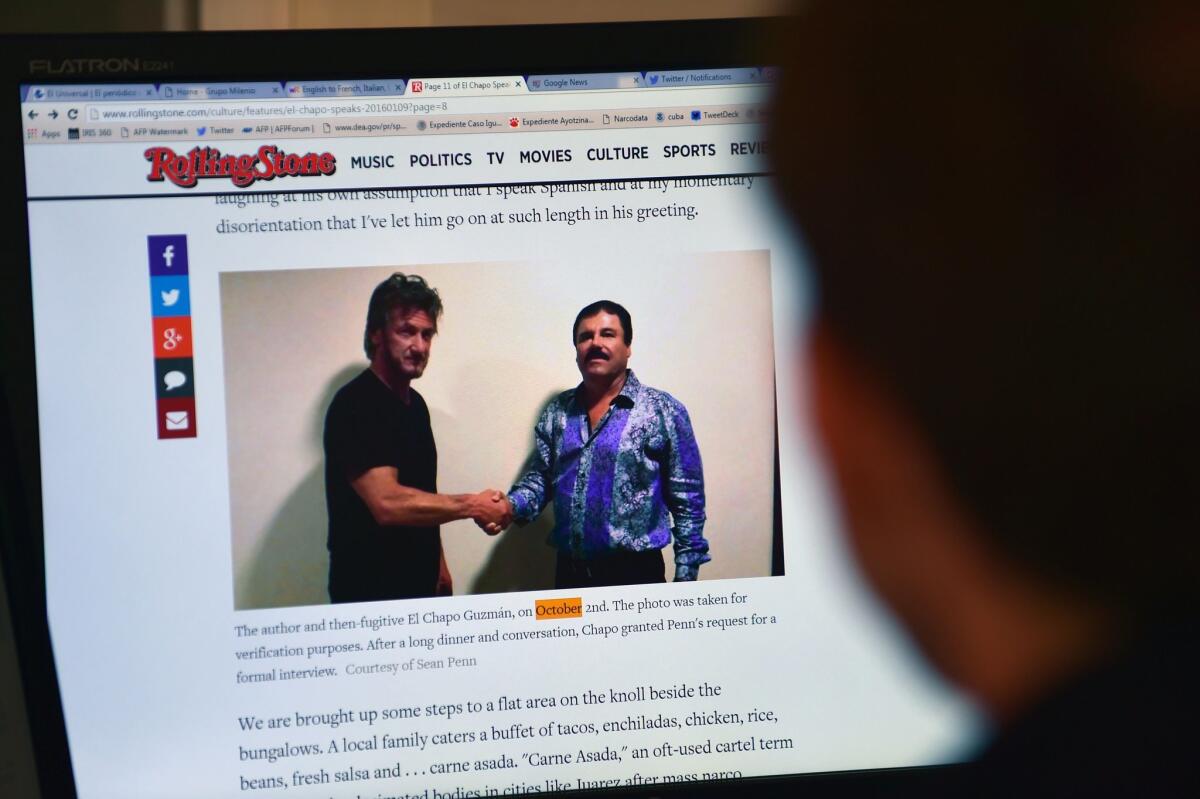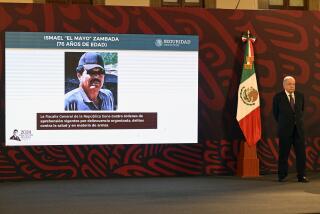Did Sean Penn do anything wrong in meeting with fugitive Joaquin ‘El Chapo’ Guzman?

Legal experts say actor Penn is unlikely to face charges in connection with his meeting with Joaquin “El Chapo” Guzman.
- Share via
Actor Sean Penn’s clandestine visit with a notorious drug kingpin in the Mexican jungle last fall for a Rolling Stone magazine interview has raised some journalistic questions but is unlikely to land him in criminal trouble in the U.S., experts said Sunday.
Legal scholars said Penn didn’t have to tell law enforcement about his October meeting with Joaquin “El Chapo” Guzman, who was on the run after escaping from Mexico’s maximum-security prison a few months earlier.
“He’s under no obligation to inform the authorities that he’s been in touch with El Chapo,” said Robert Weisberg, a professor at Stanford Law School.
In order to charge Penn as a so-called accessory after the fact, prosecutors would have to show that the actor did more than just meet with Guzman -- such as, Weisberg said, offering the fugitive advice on how to avoid detection.
Penn wrote in his Rolling Stone article that he approached the meeting as a curious journalist.
“My only interest,” he wrote, “was to ask questions and deliver his responses, to be weighed by readers, whether in balance or contempt.”
Laurie Levenson, a Loyola Law School professor and former federal prosecutor, compared Penn’s legal situation to those of the journalists who conducted interviews with Edward Snowden, a former National Security Agency contractor charged with violating the Espionage Act for leaking secret documents.
Making false statements on a government form while traveling-- or lying to investigators, regardless of intent -- could result in charges of lying to a federal agent, Levenson said. But not telling authorities about a meeting with an interview subject, even a fugitive, isn’t against the law, she said.
NEWSLETTER: Get the day’s top headlines from Times Editor Davan Maharaj >>
“We don’t have a duty -- necessarily -- to help the government,” Levenson said. “You just can’t get in the way.”
It is possible, she said, that Penn could be subpoenaed to testify at a grand jury about his meeting with Guzman.
Some journalism ethics experts have questioned other aspects of the Rolling Stone piece.
Andrew M. Seaman, who covers health for Reuters and who heads the Society of Professional Journalists’ ethics committee, described the story as ethically flawed, noting that Guzman got the final say in what was published about him.
A disclaimer at the top of the article explains that “an understanding was brokered with the subject that this piece would be submitted for the subject’s approval before publication.” Although the story said the “subject did not ask for any changes,” Seaman said the agreement with Guzman was problematic.
Giving a source the final OK on a story sacrifices the journalist’s independence, Seaman said. Even if Guzman didn’t ask for changes to the piece, Seaman said Penn’s knowing that Guzman would read it before publication could cause him to avoid including more unflattering material out of a fear the kingpin “could pull the plug” on the story.
“When you give a source final approval over the actual story,” he said, “it discredits the whole thing.”
For more news from the Los Angeles County criminal courts, follow @marisagerber
MORE: Get our best stories in your Facebook feed >>
MORE ON “EL CHAPO”
A neighbor’s tip led authorities to the capture of ‘El Chapo’
White House questions Sean Penn role in drug kingpin case
Actress involved in Sean Penn-’El Chapo’ meeting is known for social activism
More to Read
Sign up for Essential California
The most important California stories and recommendations in your inbox every morning.
You may occasionally receive promotional content from the Los Angeles Times.











